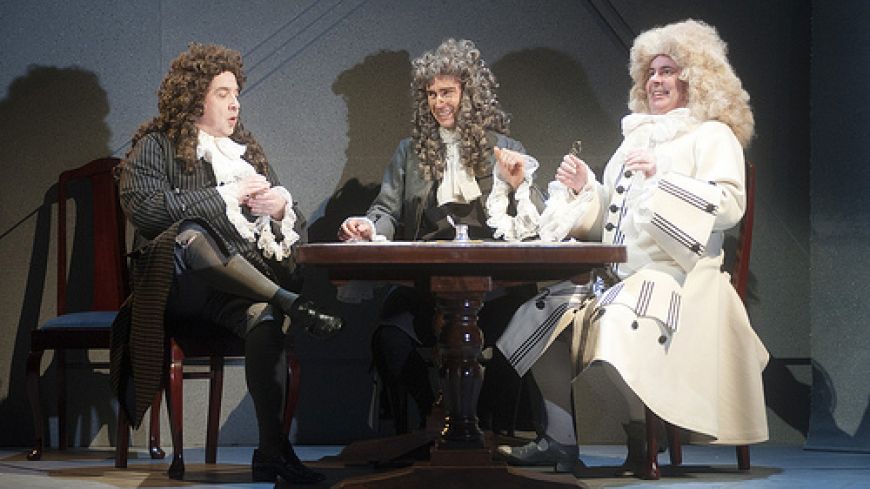
Given that the people of Scotland will vote in a few months on whether they believe Scotland should be an independent country (or not), it’s no surprise play-makers should have turned their attention to events which have brought us to this place.
‘Union’ is that increasingly rare bird, the drama-documentary, or at least is so in parts.
It takes an avian-like overview of the negotiations (or some of them) that led to the signing of the Treaty of Union of 1707 between Scotland and England, intercutting them with the relationship between Allan Ramsay, Scots wig-maker turned poet and Daniel Defoe, English ‘agent’ and fellow writer.
Ramsay and Defoe meet in an Edinburgh tavern – no surprises there – already a hubbub of political dissent aroused by the impending debates in the Scottish Parliament.
Thus far, quite promising, but all descends rapidly to caricature and cliché, as the tart with a heart and Ramsay morph into a courting couple while around them the great and good are set to mouthing the repetition of some tendentious assertions – William of Orange was gay – at best unproven. Queen Anne and Sarah Churchill had a lesbian relationship – again unlikely, and why, by the way, do both they and other English characters assume accents improbable for the time? To be fair, that sleekit, souple shape-changer, ‘the guid Scots tongue’ is scarcely better served, here very nearly justifying its dismissal by our smugly self-satisfied ‘superiors’ as ‘the language of the gutter’.
Much of the comedy of the play relies on that cheapest of laughs, ‘dirty’ words. Say it loud and rude enough, and it seems an Edinburgh bourgeois audience will always rise to the occasion, although this reviewer couldn’t help but reflect that in early eighteenth century Scotland the word ‘hooker’ would more likely suggest a water pipe than a lady of loose morals.
Elsewhere, the failure of the Darien scheme is cited as a prime cause of Scotland’s seeking union with England. However, The Company of Scotland Trading to the Indies continued beyond the end of that affair, and ultimately produced profits for its investors. In ‘Union’, it seems that at several points Homer does not nod so much as lose consciousness completely.
Having written thus, this reviewer ought to confess that he trained (twice) as a historian, and his more recent and partly published work being on one of the numerous failed attempts to produce a union of the Scottish and Westminster Parliaments – that of 1643-7, and thus aware of the very mixed motives of those involved then and in later attempts to achieve a settlement. ‘Bought and sold for English gold’ may have a nice ring to it, but it oversimplifies and obscures events and individuals whose statements and actions evince more dramatic potential than is unleashed in ‘Union’s lengthy re-iteration of an out-dated interpretation.
Pedantic and po-faced as it may seem to suggest that those of us who give up some two and a half hours of our time deserve a more considered and closely argued item than is offered here, one is left with the impression of an opportunity squandered – some might say this is simply a reflection of the Union itself. This reviewer was certainly left with the feeling that the subject matter, the excellent cast and above all the audience, deserved far better.
Show times
20 March 2014 to 12 April 2014, 7.45pm (Wed/Sat 2.30pm)
Tickets
£14 - £27.50

